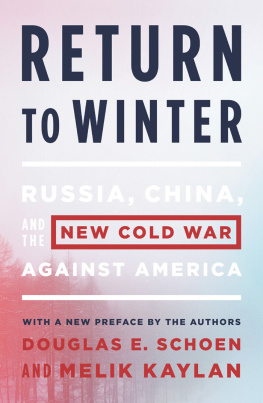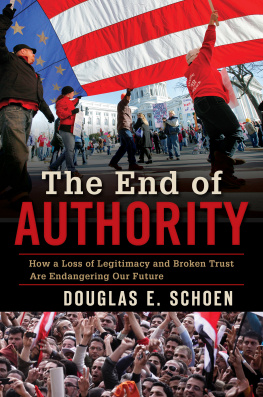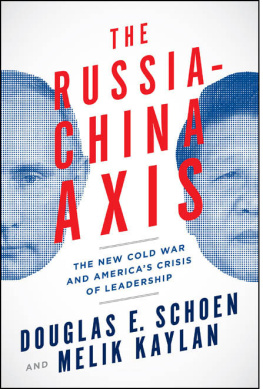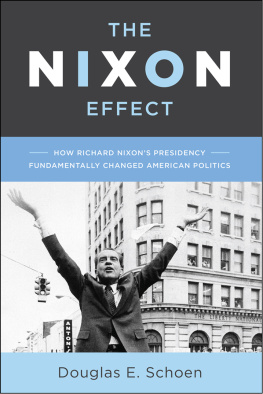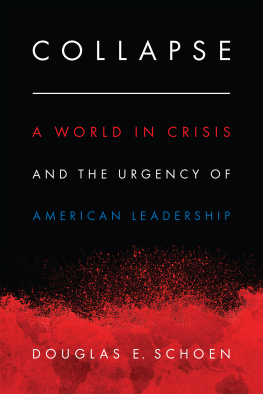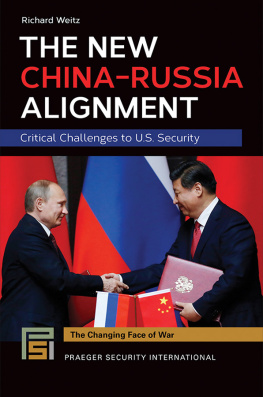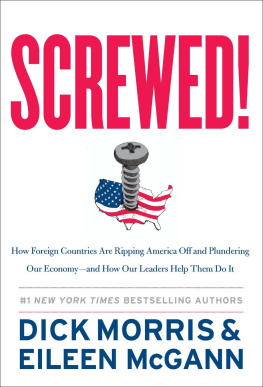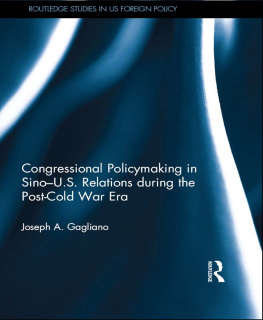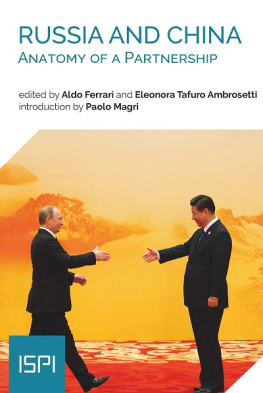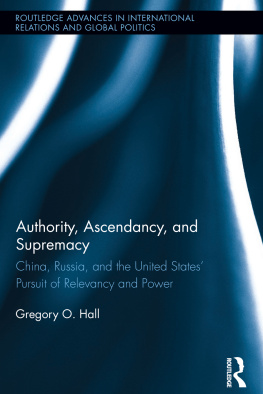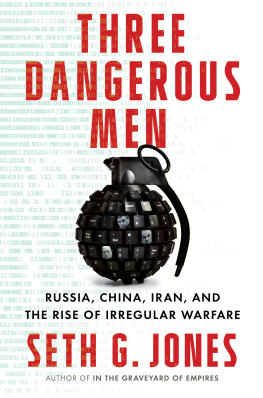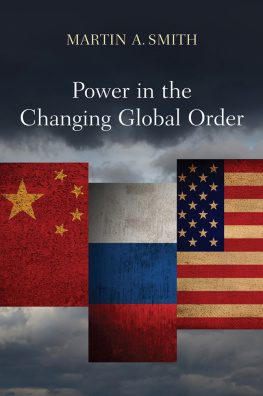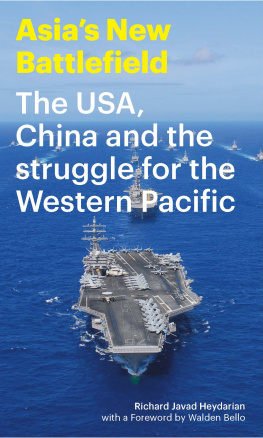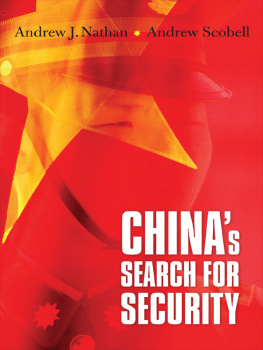RETURN TO WINTER
PRAISE FOR RETURN TO WINTER, PREVIOUSLY PUBLISHED AS THE RUSSIA-CHINA AXIS
The Russia-China Axis puts on the table what many have preferred to ignore or wish away, namely that our current foreign policy is causing grave and systemic harm to American interests all around the world. Schoen and Kaylan thoroughly document the problem and propose countermeasures that should jump-start a long-overdue national discussion of how America can right itself.
John Bolton
Former United States ambassador to the United Nations
Doug Schoen and Melik Kaylans book The Russia-China Axis: The New Cold War and Americas Crisis of Leadership is a wake-up call for the resurrection of American strategic, visionary leadership in the face of a growing global crisis for liberal democratic states. Schoen and Kaylan identify this adversarial global environment and present strategies for using elements of our national power to secure freedom on this complex 21st-century battlefield. This is a must-read for those who care about Americas place in the world and her security.
Allen B. West
Lieutenant colonel, U.S. Army, retired (19822004) Member of 112th U.S. Congress (20112013)
This book is a clarion call for American leaders to stand up against the burgeoning China-Russia axis that supports rogue states and values. Eloquently and with plentiful evidence, the authors splinter any illusion that these two rising powers share U.S. values or interests. They note that a new Cold War has erupted, and that we are the only ones not fighting. This is a must-read for anybody concerned about American foreign policy.
Anders slund
Peterson Institute for International Economics Former economic adviser to the Russian government and author of How Capitalism Was Built

2014, 2015 by Douglas E. Schoen and Melik Kaylan
Preface 2015 by Douglas E. Schoen and Melik Kaylan
All rights reserved. No part of this publication may be reproduced, stored in a retrieval system, or transmitted, in any form or by any means, electronic, mechanical, photocopying, recording, or otherwise, without the prior written permission of Encounter Books, 900 Broadway, Suite 601, New York, New York, 10003.
First American edition published in 2014 by Encounter Books,
an activity of Encounter for Culture and Education, Inc.,
a nonprofit, tax exempt corporation.
Encounter Books website address: www.encounterbooks.com
The paper used in this publication meets the minimum requirements of ANSI/NISO Z39.481992 (R 1997) (Permanence of Paper).
First paperback edition published in 2015.
THE LIBRARY OF CONGRESS HAS CATALOGUED
THE HARDCOVER EDITION AS FOLLOWS:
Schoen, Douglas E., 1953, author.
Return to winter: Russia, China, and the new cold war against America / by Douglas E. Schoen and Melik Kaylan.
pages cm
Originally published in hardback in 2014 as: The Russia-China axis: the new cold war and Americas crisis of leadership.
Includes bibliographical references and index.
ISBN 978-1-59403-844-0 (ebook)
1. United StatesForeign relations21st century. 2. United StatesForeign relations administration21st century. 3. National securityUnited States. 4. Russia (Federation)Foreign relationsChina. 5. ChinaForeign relationsRussia (Federation) 6. World politics20052015. I. Kaylan, Melik, 1962, author. II. Title.
JZ1480.S358 2014
327.47051dc23
2014002441
Contents
W e wrote most of this book before the recent, unfolding events in Ukraine, as well as before further developments confirming the existence of a Russian-Chinese alliance. These events and others, in our view, only confirm the validity and relevance of our arguments, but we offer this foreword as a more current take on the state of affairs as we go to press (2014).
Now Russia-China cooperation is advancing to a new stage of comprehensive partnership and strategic interaction. It would not be wrong to say that it has reached the highest level in all its centuries-long history.
VLADIMIR PUTIN
[Russias and Chinas] enhanced partnership marks the first emergence of a global coalition against American hegemony since the fall of the Berlin Wall.
CHARLES KRAUTHAMMER
The Sino-Soviet rift that brought the two countries to the brink of nuclear war in the 60s has been healed rather dramatically.
STROBE TALBOTT
The echoes of the non-aggression pacts of the 1930s get louder in this age of American retreat.
WALL STREET JOURNAL
If not letting America have its own way is Mr. Obamas objective, he is an unparalleled foreign-policy success.
JOHN BOLTON
T his will be the biggest construction project in the world for the next four years, without exaggeration, Vladimir Putin said in Shanghai in May 2014, as he raised a glass to drink a toast with Chinese president Xi Jinping.
The two leaders were celebrating the signing of a 30-year, $400 billion natural-gas deal between their countriesthe biggest in the history of the natural-gas industry. Under the terms of the deal, Russia would supply the Chinese with natural gas for the first time38 billion cubic meters of gas per year, through pipelines and other massive infrastructure investments. The Chinese would gain a major new source of energy, and a cleaner-burning fuel, in a country facing major pollution problems. Russia would acquire a massive new customer base for its gas, at a time when Europe seeks to diversify from Russian sources. The deal, Putin said, was an epochal event in the relationship between the two nations. For his part, President Xi, always the less voluble of the two leaders, spoke of expanding commerce with Russia. We are determined that trade between our countries will reach $100 billion by 2015, he said. Moscow hopes to double that figure by 2020.
The agreement had been in the works for a decade, but some commentators saw it solely in the context of a current crisis: the Western reaction against Russia after its illegal annexation of Crimea in Ukraine, and the threat that war might break out between Russia and Ukraine. The crisis in relations with the West over Ukraine has made ties to Asia, and particularly relations with its economic engine, China, a key strategic priority, the New York Times asserted, discussing Putins interest in China.
That sounded perfectly logical. It was also perfectly wrong.
The truth is, Putins trip to Shanghai was only the latest evidence of an unfolding alliance between Russia and China that most observers are only now starting to acknowledge. The gas deal was so momentous that it would have been impossible to ignore; but the signs of Russian and Chinese collaboration are everywhere, and they have been mounting for more than a decade.
Russia-China cooperation is advancing to a new stage of comprehensive partnership and strategic interaction, Putin said on the eve of his visit to Shanghai. It would not be wrong to say that it has reached the highest level in all its centuries-long history. Indeed, Putin has turned to China for financing, trying to roll back limits on Chinese investment in the Russian economy in the hope of luring cash into industries from housing to infrastructure to natural resources. Russia seeks Chinas help to build a bridge to the Crimean peninsula.
This expanding trade is part of a larger story: Russia and China, once Communist adversaries during the Cold War, now increasingly act in concert. Beijing tacitly supported Russian moves in Crimea by abstaining from a vote in the United Nations, even though Moscows actions violated a stated core principle of Beijings foreign policy: noninterference. The two countries also lined up on the same side at the UN regarding the Syrian civil war.
Next page
